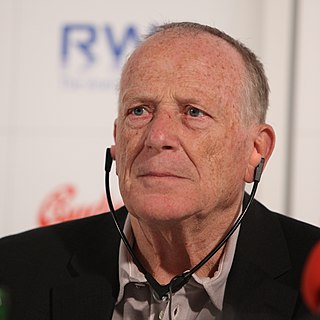
DEFA was the state-owned film studio of the German Democratic Republic throughout the country's existence. Since 2019, DEFA's film heritage has been made accessible and licensable on the PROGRESS archive platform. The DEFA Foundation is a non-profit organisation that was established in order to preserve the films in the DEFA library as well as the film studios, and make them accessible to the public.

Frank Paul Beyer was a German film director. In East Germany he was one of the most important film directors, working for the state film monopoly DEFA and directed films that dealt mostly with the Nazi era and contemporary East Germany. His film Trace of Stones was banned for 20 years in 1966 by the ruling SED. His 1975 film Jacob the Liar was the only East German film ever nominated for an Academy Award. After the fall of the Berlin Wall in 1989 until his death he mostly directed television films.

The DEFA cannon is a family of widely used French-made aircraft revolver cannon firing 30 mm caliber NATO standard rounds.

The GIAT 30 is a series of 30 mm cannon developed to replace the DEFA 550 series weapons on French military aircraft.

Gojko Mitić is a Serbian-German actor and director. He gained great popularity in the German Democratic Republic (GDR) as the leading actor in historical and fictional Indian personalities in numerous DEFA Indian films. His popularity may be recognizable from the fact that both in the GDR and later in the Federal Republic of Germany attempts were made to attach labels to him: "DEFA bosses" on the one hand, "Winnetou of the East" on the other. However, Gojko Mitić never portrayed the latter role in a film. This Winnetou formulation refers more to the popularity of Gojko Mitić compared to the actor of the role from the West, the Frenchman Pierre Brice.

The DEFA Film Library at the University of Massachusetts Amherst is the only research center and archive outside of Germany devoted to a broad spectrum of filmmaking from and related to the former German Democratic Republic. DEFA was the name of the state-owned film studio of the German Democratic Republic.

Milcząca Gwiazda, literal English translation The Silent Star, is a 1960 East German/Polish color science fiction film based on the 1951 science fiction novel The Astronauts by Polish science fiction writer Stanisław Lem. It was directed by Kurt Maetzig, and stars Günther Simon, Julius Ongewe and Yoko Tani. The film was first released by Progress Film in East Germany, running 93 min. Variously dubbed and cut versions were also released in English under other titles: First Spaceship on Venus, Planet of the Dead, and Spaceship Venus Does Not Reply.
![<i>Jacob the Liar</i> (1975 film) 1974 [[East Germany]] film](https://upload.wikimedia.org/wikipedia/en/0/0d/Jacobliarposter.jpg)
Jacob the Liar is a 1975 war drama film directed by Frank Beyer, adapted by Beyer and Jurek Becker from the latter's novel of the same title. Set in Nazi-occupied Poland during the Holocaust, the film centers on Jakob Heym, a Polish Jew who attempts to raise the morale inside the ghetto by sharing encouraging rumors that he claims he has heard on an (imaginary) radio. The film was a co-production between East Germany and Czechoslovakia. It premiered on East German television on 22 December 1974, and was released theatrically on 18 April 1975.
Trace of Stones is a 1966 East German film by Frank Beyer. It was based on the eponymous novel by Erik Neutsch and starred Manfred Krug in the main role. After its release, the film was shown only for a few days, before being shelved due to conflicts with the Socialist Unity Party, the ruling communist party in the German Democratic Republic. Only after 23 years was the film shown again, in November 1989.

Wolfgang Kohlhaase was a German screenwriter, film director, and writer. He was considered "one of the most important screenwriters in German film history", and was one of the GDR's most well-known and prolific film screenwriters. Kohlhaase was awarded the Honorary Golden Bear at the 2010 Berlin International Film Festival.
I Was Nineteen is a 1968 East German film produced by Konrad Wolf for the DEFA studio.

Renate Krößner, also known as Renate Krössner, was a German actress who was internationally recognized for roles in films and television. She was awarded the Silver Bear for Best Actress of the Berlinale for the title role in the 1980 film Solo Sunny. From 1985, she worked in West Berlin and was known for roles in TV series such as Tatort and Einmal Bulle, immer Bulle.

Blum Affair is a 1948 German drama film directed by Erich Engel and starring Hans Christian Blech, Ernst Waldow and Karin Evans. It is based on a real 1926 case in Magdeburg in which a German Jewish industrialist is tried for murder. The film was produced in the future East Germany and produced by DEFA. It was shot at the Babelsberg Studios and Althoff Studios in the Soviet zone. The film's sets were designed by the art director Emil Hasler.

Divided Heaven is an East German drama film directed by Konrad Wolf. It was released in 1964.

Hans Karl Klering was a German actor, director, voice actor, graphic designer and author. He joined the Communist Party and went into exile in the Soviet Union in 1931, returning to Germany in 1945. In 1946, he became a co-founder of DEFA, the East German state-owned film studio, as well as one of its directors and board members.
![<i>Hands Up or Ill Shoot</i> 2009 [[German Democratic Republic]] film](https://upload.wikimedia.org/wikipedia/en/d/dc/HandsUpPoster09.jpg)
Hands Up or I'll Shoot is an East German crime comedy film directed by Hans-Joachim Kasprzik, who wrote the script along with Rudi Strahl. Rolf Herricht starred as officer Holms.
Arthur Maria Rabenalt was an Austrian film director, writer, and author. He directed more than 90 films between 1934 and 1978. His 1958 film That Won't Keep a Sailor Down was entered into the 1st Moscow International Film Festival. Two years later, his 1960 film Big Request Concert was entered into the 2nd Moscow International Film Festival. His career encompassed both Nazi cinema and West German productions. He also wrote several books on the 1930s and 1940s wave of German cinema.
Die andere Liebe is a 1988 East German public education documentary film directed by Axel Otten and Helmut Kißling. It is 34 minutes long and in German with English subtitles. It was the first film produced by East Germany's state-run DEFA film studios that dealt with the subject of homosexuality. It was commissioned by the German Hygiene Museum in Dresden. It was made in co-operation with gay and lesbian activists in East Germany and includes interviews with lesbians and gay men talking about their lives. The film was aiming to convey official state acceptance of homosexuality.

PROGRESS is a German film distributor. It was established in 1950 to handle the release of films produced by DEFA, the state-controlled production outfit of communist East Germany. Since 1989 Progress distributes the entire DEFA film collection.







![<i>Jacob the Liar</i> (1975 film) 1974 [[East Germany]] film](https://upload.wikimedia.org/wikipedia/en/0/0d/Jacobliarposter.jpg)





![<i>Hands Up or Ill Shoot</i> 2009 [[German Democratic Republic]] film](https://upload.wikimedia.org/wikipedia/en/d/dc/HandsUpPoster09.jpg)
